THE TRUTH surrounding last July’s murder of three schoolgirls at a dance class in Southport has turned out to be even more disturbing than the rumours which swirled around social media at the time.
Not only was the killer, Axel Rudakubana, a terrorist at least partly inspired by al-Qaeda, but he had been referred to the Government’s Prevent programme no fewer than three times.
ReutersKiller Axel Rudakubana had been referred to the Prevent programme three times[/caption]
GettyStarmer has announced an inquiry into the UK’s counter terrorism system[/caption]
Each time, fears that he could turn into a killer were dismissed – and he was free to go on to make online purchases of weapons and the deadly poison ricin.
An academic paper widely misused as a training manual for terrorists was found in his bedroom.
At the time, it might be remembered, police declined to treat the killings as an act of terrorism.
People who repeated rumours online – some of which, such as the claim the perpetrator was an asylum-seeker, were untrue – were arrested.
Yet when riots broke out in response to accusations that the truth was being withheld from the public, few in authority had any hesitation in asserting that they were the work of the far-Right.
Another catastrophic failure of the Government’s anti-extremism strategy was laid aside while the public was invited to believe that the real threat to society comes from white supremacy.
To give him credit, Keir Starmer appreciates that this will no longer do. The state’s failings, he admitted today while announcing an inquiry into the killings, “leap off the page”.
The Government’s anti-terrorism strategy, he admitted, would have to take much more seriously the threat posed by the fabled ‘lone wolves’ – terrorists who act alone, or at least succeed in convincing the world that they have no accomplices.
The truth is that the Government’s Prevent programme has been failing for years.
Time and time again – such as with the Manchester Arena bombings and the London Bridge attacks, both in 2017 – it has emerged that the perpetrators were known to the authorities, often to MI5, but that they were dismissed as a threat.
The brother-in-law of Khuram Butt, who led the London Bridge attacks, had called an anti-terror hotline, concerned that he was plotting a terror attack – but the information was not acted upon.
Salman Abedi, who killed 22 people attending an Ariana Grande concert in the Manchester Arena, had been on MI5’s files for many years, yet his trip to Libya shortly before the bombing did not arouse attention.
One thing the inquiry must ask is whether there is a link between the failure to stop terror attacks and the failure to challenge grooming gangs in Rochdale and elsewhere.
Namely, did people in authority turn a blind eye to terror suspects for fear of being accused of racism or Islamophobia?
When the Prevent programme was set up by the Blair government in 2003 it was in response to the 9/11 attacks.
Yet over the years its focus on Islamist terrorism was allowed to drift, following complaints by the Muslim Council of Great Britain and others that it was unfairly targeting Muslims.
Far Right focus
EPAThe Manchester Bomber had also been flagged to Prevent before the attack[/caption]
Instead, Prevent has been allowed to become principally a mechanism for sniffing out far-Right extremists.
In the year to March 2023, 19 per cent of the 6,817 referrals to Prevent were connected with far-Right extremism, with 11 per cent connected with suspected Islamist extremism.
Of those suspects who went on to be put on the Channel Programme – which is supposed to provide targeted support to steer people away from extremism – 46 per cent were of the far-Right and just 18 percent Islamist.
Of course there are far-Right extremists who pose a threat, but the statistics speak for themselves.
Over the past 20 years at least 94 people have been killed and hundreds injured in Islamist terror attacks.
I haven’t included the Southport victims because it is not clear what ideology, if any, was being followed by Rudakubana – the British-born son of refugees from Rwanda.
In contrast, three people have been killed in attacks which could be described as far-Right: Labour MP Jo Cox, the man killed outside Finsbury Park mosque by a van driven by Darren Osborne in 2017 and a Muslim man fatally stabbed by a Ukrainian student in Birmingham in 2013.
None of this, of course, excuses last summer’s riots. Even if the murders of the three girls had clearly been an Islamist attack, it wouldn’t justify the thugs who attacked a mosque.
The difference between Islam – a religion followed by millions around the world, the vast majority of whom are peaceful – and Islamism, a political movement which seeks to impose religious fundamentalism on the world, cannot be emphasised enough.
But when public bodies are dealing with the threat of terrorism, they can’t afford to let suspects off the hook for fear of appearing to be racist or Islamophobic.
Where people are driven by violent ideology, they must challenged, whatever their background and whatever their ideology.
That is the lesson which needs to come out of the inquiry.
PASalman Abedi was partly responsible for the Manchester terror attack[/caption] Published: [#item_custom_pubDate]















































































































